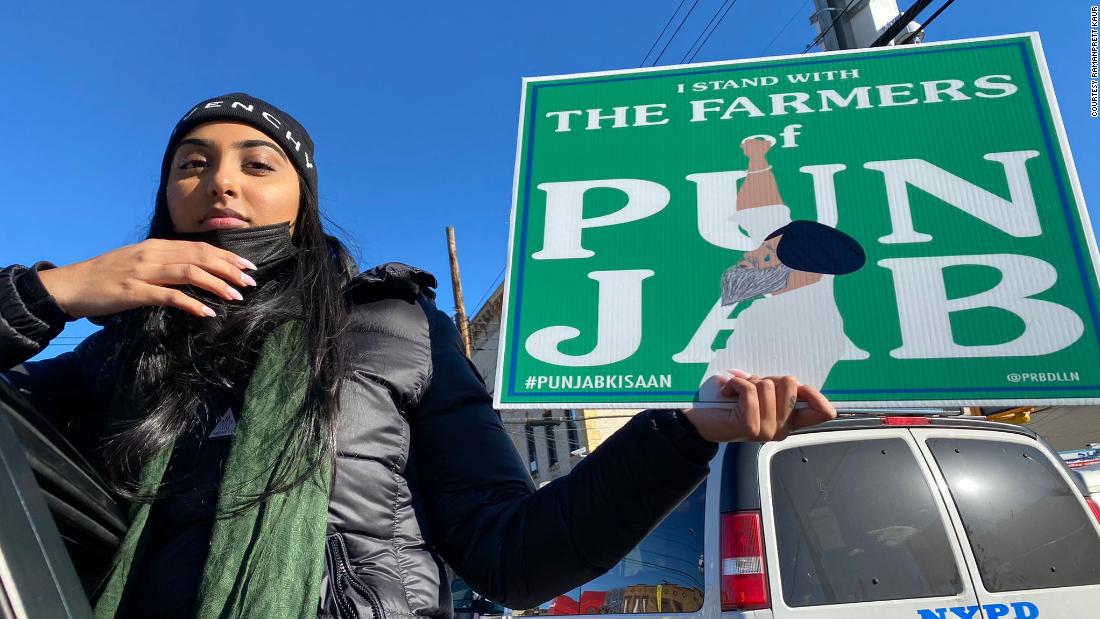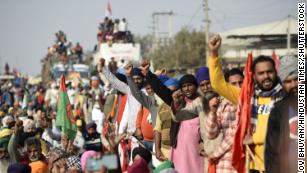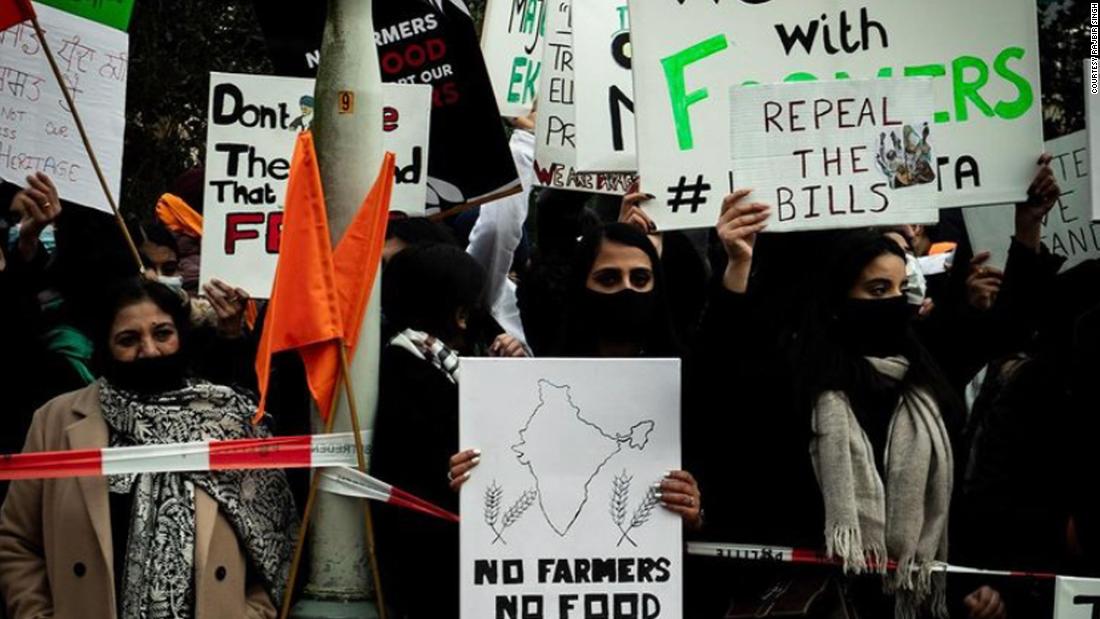The farmers’ protest is like no other. People are reaching Delhi with clothes, a few thousand rupees, and the confidence that their fellow protesters will take care of the rest

Women farmers during a march in Greater Noida, Uttar Pradesh, on 27 November, the first day of protests. (HT)
By Pooja Singh
LAST UPDATED 12.12.2020
"We might not be there but our voices are reaching Dilli,” Pratibha Shinde shouts over the phone from Maharashtra’s Jalgaon city. It’s the afternoon of 8 December and slogans of “Bharat zindabad”, “Kisan zindabad” and “Humara bhaichara zindabad” behind her drown out our conversation. It’s the day farmer unions across the country have called for a Bharat Bandh, following protests that started late November in Delhi over three farm laws rushed through Parliament in September.
Shinde, like her 2,000-odd fellow farmers, had been at the Jalgaon protest site since 9am. “How much longer will the farmer stay quiet? Bas ho gaya ab (enough is enough),” she says, after finding a quiet corner. Her voice sounds hoarse. She blames sleepless nights. “I was making arrangements for the protest, finishing housework and getting ready for Dilli,” explains the president of the Lok Sangharsh Morcha, which represents farmers from Maharashtra and Gujarat. That evening, she was leaving for Delhi to join hundreds of thousands of protesting farmers, with a bag containing eight saris and no return train ticket. “God knows till when Modiji (Narendra Modi) will ignore our demands. Till then, I am not coming back.” Over 1,000 farmers from the two western states were set to join her.
On 27 November, when the Centre allowed farmers to enter Delhi and protest over a set of laws ushering in market-oriented “reforms” they see as inimical to their interests, nobody thought the agitation would take the shape it has. Some commentators argued the protests were limited to farmers from states like Punjab, where over 90% of them depend on government purchase of crops. Within two weeks, however, the protests have taken the form of a national movement.
Thousands of farmers from states like Himachal Pradesh, Madhya Pradesh, Assam, Tamil Nadu, Andhra Pradesh and Gujarat are trickling in every day to join those already stationed at several points of entry to Delhi, with no intention of returning till their demands—officially, the repeal of the three laws—are met. Those who can’t visit Delhi are holding protests in their villages and cities. The fear is the same: The “kala kanoon (black laws)”, as farmers describe them, will effectively eliminate the safety net of minimum support price, do away with mandis and leave farmers at the mercy of big companies.
“It’s a farmer’s fight. Not a state’s. And it has an all-India character,” says Avik Saha, secretary of the All India Kisan Sangharsh Coordination Committee, an umbrella body of over 200 farm organisations. “There’s a deep distrust within the farmers, and it’s out in the open. They are tired of authorities not listening to them.”
BREAKING BARRIERS
_1607787732131.jpg)
Farmers from Haryana with their 'hookah' at the Singhu border. (Pooja Singh)
Jasmeet “Vicky” Singh, 20, is ready to wait six months, if that’s what it takes to get a decision in favour of farmers. At the Singhu border, the 30km stretch between north-west Delhi and Haryana that has been occupied by protesters, the lanky Singh is famous as the “barricade breaker”. “Not three. Eight,” the Ambala resident corrects me when I ask about the number of police barricades he has run over with his blue tractor since the protests started.
Are you a farmer? I ask. “No. We have land but we don’t farm. But after completing my studies this year, I have decided to become a farmer. Friends tell me to move to Delhi and find a job but I want to be a farmer. It’s my way of serving India.”
Singh then asks me if I have had langar. A beggar who has been overhearing our conversation interjects: “Madamji kha lo. Humne ek hafte se bheek hi nahi mangi hai. Yeh log kabhi hatne hi nahi chahiye (Do eat. We haven’t had to beg for the past one week; food is available in abundance. These people should never leave).”
That’s the other reason this farmers’ protest is like no other in recent times. People are reaching Delhi via trains, buses or trucks, with a bag of clothes, a few thousand rupees, and confidence that their fellow protesters will take care of the rest.
The Singhu border, especially, has turned into a village. After crossing barricades and barbed wire spread over half a kilometre under the watchful eyes of the police, you reach a crowded space where people seem to have forgotten all about the pandemic. They are milling about without masks or physical distancing. The aroma of kada prasad (halwa, a gurdwara offering, is served through the day) wafts across. Truckloads of vegetables and rice, contributions by relatives and friends of farmers, are lining up in the service lane. When I reached Singhu at 11am on 6 December, two tankers of milk had just rolled in. One of the drivers said they were offerings from a gurdwara nearby.
Every 100m, a farmer invites you with folded hands to have langar. If you decline, they insist on offering tea. Some are distributing food to the police. Many are cutting vegetables for the 24x7 community kitchen, while others are giving away biscuits, sanitary pads, blankets or Odomos, for free. The elderly, lying on beds of mattresses and hay inside their tractor trolleys-turned-mini caravans, are talking about revolution and singing songs of freedom. Youngsters are shouting slogans. You are surrounded by at least 100 people, mostly men, at any point but there’s a sense of security.
“People are saying it’s only Punjab and Haryana farmers who are protesting. They should come and see, it’s Little India here,” says Shariq Husain, 29, who has put his construction business on hold for the protest. Every morning, he, along with 10-15 friends from Old Delhi, Nizamuddin and Okhla, reaches the border with 1,000-2,000 packets of mutton pulao and vegetable pulao. “We offer our namaz there only. Often, we end up staying at night also. This is what India is all about—looking after guests, feeding people with love, making room for every religion.”
In many ways, the farmers’ movement is a reminder of the Citizenship (Amendment) Act protests a year ago, when millions came together to show their support for a cause that may not have affected them directly. Yashwant Singh, 47, a sugar-cane farmer from Uttar Pradesh, has been sitting at north-west Delhi’s Tikri border protest site even though he personally may not be hit as badly as others by the laws. He says: “I’m here for the farmers. We’ve been suppressed for too long.”

Protestors at Delhi's borders have turned their trucks into temporary homes. (Reuters)
Even non-farmers are volunteering. Dianne N., a Delhi University student, has been distributing medicines for the past week at Tikri, where the number of protesters is growing. “We thought there are so many older people here and it’s cold…. So we offer some balms and over-the-counter medicines,” says Dianne, who returned from her Bengaluru home two weeks ago so she could volunteer.
Unlike young Vicky Singh, Ramesh Antil, a Sonipat farmer in her 50s, is praying for the protests to end quickly. “My old bones are troubling me in this cold,” she says, who was sitting in the women’s tent at Singhu. “Media talks about how rich Punjab and Haryana farmers are, that there’s constant supply of food, but they forget how hard we work. Are we enjoying sitting under the open sky in such cold weather? Corona won’t kill us but these laws will. Modiji is like our baap (father figure) but he should understand, how will we survive if he exposes us to the corporates?” she says, in Hindi.
NEAR, YET TOO FAR
Santosh Sharma, 37, wanted to join his 1,000-plus farming community from Madhya Pradesh at Tikri but couldn’t because of his elderly parents. “They have not been keeping well; corona is everywhere. We are regularly holding protests here,” says Sharma over the phone from his home in Harda, on 7 December. Two days later, he calls to say he has taken the train to Delhi. “We will anyway die of debt if the government won’t listen. I will have to be there to fight for my rights.”
Not everyone who wanted to has been able to reach the Capital. Maheriya Laxmiben Ranchhodbhai, a Dalit farmer from Gujarat’s Saroda village in Dholka taluk, was supposed to leave for Delhi on 8 December but the police detained her that morning. “They said I would have protested (since it was Bharat Bandh) and caused nuisance,” she tells me from the police station. The police inspector at the Dholka station, A.B. Ansari, said, “She would have caused destruction of public property.” By 6pm, Ranchhodbhai had been released.
About 1,300km away, in Tamil Nadu’s Erode, Kannaiyan Subramaniam is content with protesting within the state. “You don’t have to be in Delhi to show your support. It will be too cold for me there,” he laughs. He believes farmers from other states were delayed in reaching Delhi owing to lack of transportation and resources.
Over the past two weeks, Prashant Jha, a small farmer from Chhattisgarh, has been walking 14km every day to a chowk in Korba where protests are being held. “11am-3pm, we are here,” he says. “We have only two options if these laws are not repealed, die under the burden of debt or kill ourselves. When we are the ones who bring food to everyone’s table, why are we being tortured like this? It’s the same fight my grandfather was fighting, then my father was fighting, and now I am fighting. I don’t want my son to fight it.”
A farmer in Assam, who doesn’t wish to be named, wants to come to Delhi but can’t since train services haven’t restarted. “We also have to look after our crops because elephants will eat them,” says the 30-year-old, who has been participating in protests against the laws and land pattas for three months in Dibrugarh. “I will leave (for Delhi) as soon as the train starts. Till then, we are strengthening our front here.”
I speak again with Pratibha Shinde after she has reached Delhi. Her first task? “Meet the farmers at the borders,” she says. “We are at a crucial time in history. This is the first time people are seeing farmers’ issues as a national issue and not just a farmer issue. We are finally being seen as what we really are, ann daata (god of food).”






 The elderly women who became the face of the Shaheen Bagh protests. Picture credit: Rakhi Bose via Instagram.
The elderly women who became the face of the Shaheen Bagh protests. Picture credit: Rakhi Bose via Instagram.







